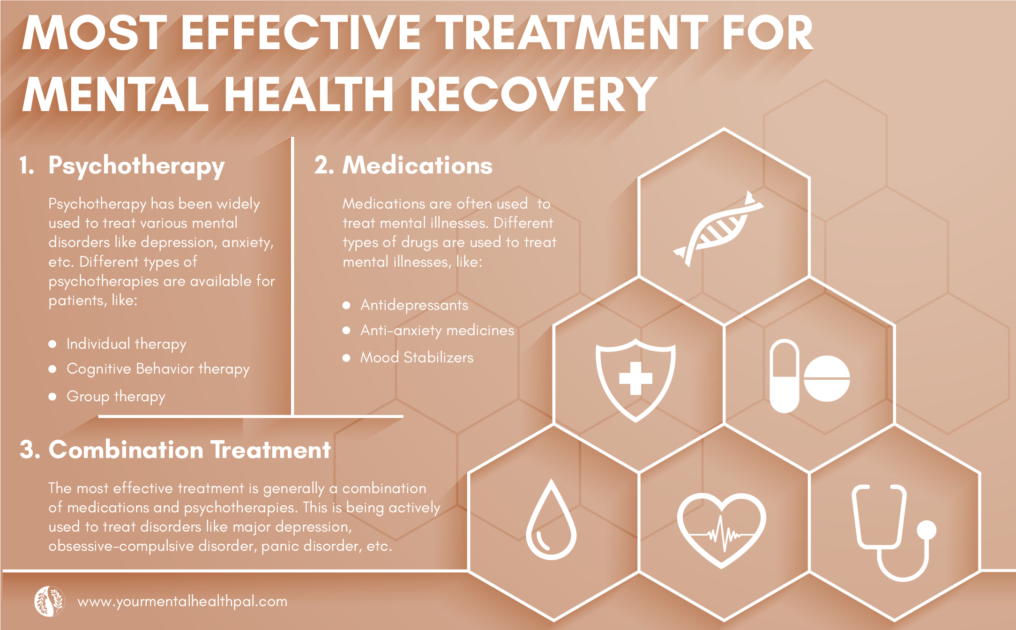
According to WHO, one in five US adults has a mental illness. That is a staggering 47 plus million people going through a mental illness. But do you know how many seek actual help and treatment? Less than half. Even among those, there are people who have waited for more than a decade to ask for help.
Let those numbers sink in.
A full 20 percent of us are suffering right now at this very moment. And most of us don’t try to seek help or treatment because of the fear of embarrassment. Many people lack knowledge of how to look for a cure for mental illnesses.
These numbers have real-world consequences. Along with complicating people’s lives, mental health problems cause damage to the country’s development and economy.
The World Economic Forum reported that mental health problems would form a significant part of the global economic burden due to non-communicable diseases. Over 200 million workdays are lost yearly due to mental illnesses.
The key to fighting the consequences of mental illness in our lives is to look for treatments. Early diagnosis and treatment are the keys to finding a cure for mental health.
Can mental illness be cured?

There is no one answer to the question ‘can mental illness be cured.’ Because frankly, there is no cure for most mental illnesses that exist. That’s the difficult hard truth. But with proper care and treatment, you can reduce your symptoms to the bare minimum. And that’s the goal, right?
Cure vs. Treatment
When we say an illness is cured, it means that it is completely treated and will never return. Malaria, jaundice, etc., are names of a few illnesses for which cure is available.
Then some diseases can’t be cured, like diabetes. Once you have diabetes, you will have to live with the condition for the rest of your life. However, even a lifelong illness like diabetes can be treated effectively. Those with diabetes who seek help, take their medications, and make lifestyle changes manage to live a long, healthy life.
Most mental illnesses are the same way. There is no one perfect magical cure for them. However, there exists a wide array of effective treatments. People with mental illnesses manage to recover well and live a healthy life through these treatments.
What is mental health recovery?
If you are asking ‘can mental health problems be cured’, well, you are fundamentally asking the wrong question. The right one is whether one can recover from a mental illness.
Recovery and cure are different. Recovery is being able to live up to your potential even with the presence of a mental illness. Recovery is not just about your symptoms. Recovery is for your life as a whole.
Mental health recovery is not a linear process.
With some illnesses, the treatment is relatively simple, and we are able to move on. Unfortunately, mental illnesses are not as straightforward. What makes matters worse is that the recovery is rarely a linear path. You don’t feel better and healthier on a continuous basis.
The thing is that life is unpredictable, and control is a myth. Our mental health can get affected by what happens internally and externally. There might be days when everything would seem right, and then you would hit one of those rough patches you worked so hard to avoid. But the same way, you might find motivation on the days you least expect to.
Our mental health is not static. It is constantly changing. Just like our lives, it is full of ups and downs. That’s why hitting a roadblock does not mean that the path you have covered till then would become useless. It doesn’t erase your milestones.
Every day you are learning. That is why you will never be back to square one. It’s because you learn something with each rough patch you recover from.
Most Effective Treatments for Mental Health Recovery
As mentioned above, unfortunately, we have no ‘catch-all’ answer for ‘how can mental illness be cured’. However, many effective treatments are available to cure mental illnesses.
Different treatments prove effective for different people. This depends on the following:
- nature of disorders or illnesses,
- severity of symptoms, and
- personal circumstances.
Here we provide a brief description of some of the most common and effective treatments available for mental health issues. Every option comes with a set of pros and cons. Hence, before starting with any one, you should research well and consult a professional.
1. Psychotherapy

Psychotherapy has been widely used to treat various mental disorders like depression, anxiety, etc. Different types of psychotherapies are available for patients, for instance:
- Individual Therapy: This is a form of therapy where an individual has one-on-one interactions with the therapists. Different strategies and approaches are used to address past trauma, anxiety, and other mental health problems.
- Cognitive Behavior Therapy (CBT): This therapy helps us understand our behavior and how it affects us. Cognitive therapy works toward addressing the automatic negative feelings that arise in people’s minds worsening symptoms of stress, anxiety, and other related disorders.
- Group Therapy: Group therapies are generally led by a therapist. It works toward discussing and addressing a specific subject that everyone in the group is working on.
2. Medications

Medications are often used to treat mental illnesses. Different types of drugs are used to treat mental illnesses, like:
- Antidepressants: This category is used to treat the symptoms of depression. However, they have also been prescribed for anxiety and insomnia in some cases.
- Anti-anxiety: These medicines are used for people who suffer from generalized anxiety, panic attacks, and social anxiety. They are only used on a short-term basis. Long-term use is associated with permanent dependence and addiction.
- Mood Stabilizers: They are generally prescribed for mood-related disorders like bipolar disorder. They aim to stabilize mood and prevent mania, mood swings, and depression.
Disclaimer: The above-suggested medications should only be used after proper diagnosis and discussion with professionals. Unregulated use can be life-threatening.
3. Combination Treatment
The most effective treatment is generally a combination of medications and psychotherapies. This is being actively used to treat disorders like major depression, obsessive-compulsive disorder, panic disorder, etc.
Can Mental Illnesses be prevented?
There is strong evidence that certain mental disorders, including depression and anxiety, are preventable if early action is taken.
But why all the hurry with the “early action?”
Well, because 75% of mental and emotional disorders develop by our early 20s.
Researchers have been actively pursuing the cause of several disorders. Severe psychotic disorders like bipolarity, schizophrenia, etc., can’t be prevented. However, the more common lot of depression, anxiety, and substance abuse can be tackled with early care.
That is why prevention and early intervention are the keys to actual progress.
Small but effective ways to look after your mental health
We might be taking strides in our world to talk about mental health and prioritizing self-care. But how many times have you consciously worked toward your mental health?
Guilty as charged, correct?
To get you started, we have curated a list of small, least intimidating, and impactful steps to take care of your mental health. We hope the ‘taking care’ action becomes a part of what we do- and not just what we talk about.
1. Give your permission to take a day off when you need it
Let’s face it. You know you need it and will be more productive if you take one. So why feel selfish to take it? Let’s start thinking of it as a preventive measure. You are taking a day off to relax yourself and your body so that you don’t have an actual sick day off.
2. Take out at least 5 minutes to meditate and do not roll your eyes at us.

We have heard of meditation as something only wellness retreats and yoga teachers would make us do, right? Well, it doesn’t have to be a whole thing to be effective. Drop the worry of achieving something or reaching true enlightenment through it. Just taking a little time out of your day to relax and let yourself breathe is enough.
3. Do something else other than watching Netflix on a day off.
If you have free time at your hand, stop using it to binge-watch Stranger Things. Try this experiment of not staring at your screens all the time. Read a book, color, call your mom or best friend, and just gossip. Yes, zoning out while watching your favorite tv show might be a good idea but try to find something else that calms you.
4. Make time for sleep

The world is absolutely not going to thrive with another sleep-deprived human. It is essential to make time for sleep. A well-rested mind will allow you to be productive, rational, and creative.
Long-term sleep deprivation is considered a risk factor for obesity, type 2 diabetes, and a weakened immune system. It hampers our cognitive abilities. An explanation for this is that when we are sleep-deprived, parts of our brain become inactive while we sleep.
Conclusion
Hopefully, now you know the answer to the question we started with – “how can mental illness be cured?”
The road is long, pal. But, you will be okay. It might seem like a fantasy right now, but hold on. You will be alright. Until then, just know that the pain you feel inside is as real as a broken bone or a bloody cut. And it is okay to talk about it openly and look for help.
Now that you know ‘how can mental illness be cured,’ let’s take you to ‘where to look for help’. To learn more about mental health, subscribe to https://yourmentalhealthpal.com/


Very helpful👍
Thank you ❤️
Great article, so well done and informative.